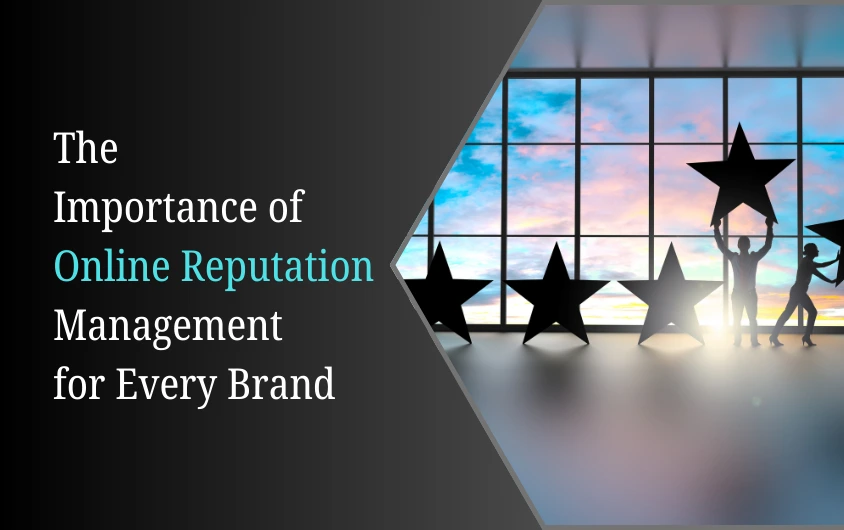The Importance of Online Reputation Management for Every Brand.
Introduction
In the current era of extensive connectivity, the online reputation of your brand is of utmost importance. A few clicks or swipes are all it takes for potential customers to form an opinion about your business. Whether you’re a budding entrepreneur or a global corporation, managing your online image is not just important—it’s essential.
Online Reputation Management (ORM) is essential in this context.But what exactly is ORM, and why should it be at the top of your business priorities? Let’s dive deep into why every brand needs a strong ORM plan to thrive in the digital age.
What is Online Reputation Management (ORM)?
Understanding ORM
Online Reputation Management (ORM) is the practice of monitoring, analyzing, and influencing how a brand is perceived online. It encompasses everything from responding to customer reviews to ensuring your brand appears positively on search engines.
Key components of ORM include:
- Tracking brand mentions
- Managing online reviews
- Mitigating negative press
- Building a positive online narrative
Evolution of ORM
ORM has evolved significantly over the years.1. The primary focus was on mitigating unfavorable search results.Today, it’s a dynamic process influenced by social media, user-generated content, and the 24/7 news cycle. Platforms like Facebook, Twitter, and LinkedIn have transformed how quickly reputations can be built—or destroyed.
Why Online Reputation Matters
Building Trust and Credibility
First impressions last a lifetime, and online, they happen in seconds. A well-managed reputation builds trust and positions your brand as credible. Think about brands like Apple or Nike—they’re not just selling products; they’re selling trust.
Impact on Revenue and Growth
Research indicates that one unfavorable review can deter 22% of prospective customers.On the flip side, a positive reputation encourages customer loyalty and drives growth. Happy customers become brand ambassadors, leading to more sales and organic growth.
Handling Negative Feedback
Negative feedback should not be viewed as a catastrophe; rather, it presents a valuable opportunity for enhancement. Addressing criticism transparently shows customers that you care about their experience, turning skeptics into loyal advocates.
Components of a Strong ORM Plan
Monitoring Online Presence
Understanding the latest discourse is the starting rule in ORM. about you. Use tools like Google Alerts, SEMrush, or Mention to track your brand’s online mentions. Concentrate on the platforms where your audience attract the most.
Managing Reviews and Feedback
Engaging with reviews, whether favorable or unfavorable, showcases your dedication to ensuring customer satisfaction.
When addressing criticism, be polite, empathetic, and solution-focused.
Social Media Management
A strong social media presence is vital for ORM. Regularly post engaging content, respond to comments, and use platforms to humanize your brand. Engaging in social media is essential, as it is the platform where discussions take place; ensure you participate in these dialogues.
Content Creation and SEO
Creating high-quality, SEO-optimized content helps shape your online narrative. Blog posts, videos, and infographics not only engage audiences but also push down negative content in search rankings.
Consequences of Ignoring ORM
Damaged Brand Image
Ignoring ORM can lead to irreversible damage. Remember the infamous United Airlines incident? A single video of mistreatment went viral, resulting in widespread backlash and a plummeting stock price.
Financial Loss
A tarnished reputation leads to a direct loss of customers and revenue. Repairing a damaged image often costs more than maintaining a good one from the start.
How to Develop a Strong ORM Plan
Identifying Goals and KPIs
Set clear goals, like increasing positive reviews by 20% or improving customer sentiment. Use Key Performance Indicators (KPIs) to assess achievement.
Building a Response Team
Establish a specialized ORM team tasked with overseeing, evaluating, and addressing online feedback.. A timely response can prevent minor issues from escalating.
Investing in Tools and Technology
Leverage ORM tools like Hootsuite, Brandwatch, and Reputology. These platforms simplify tracking and managing your online reputation.
Conclusion
A strong Online Reputation Management (ORM) plan is no longer a luxury—it’s a necessity in today’s digital-first world. Your online reputation directly impacts with Digital Jamana how customers perceive your brand, influencing their decisions and your overall success. Proactively managing your online image ensures that your brand stays trustworthy, credible, and relevant in a competitive market.From monitoring online mentions to responding to reviews and creating engaging content, ORM allows you to shape public perception and address issues before they escalate.Neglecting ORM can result in a damaged reputation, decreased revenue, and a decline in customer trust.Taking control of your online reputation today sets the foundation for long-term growth and success. Remember, a strong reputation isn’t built overnight—it’s cultivated through consistent effort, transparency, and a customer-first approach. Start implementing your ORM plan now and watch your brand thrive in the digital age.

